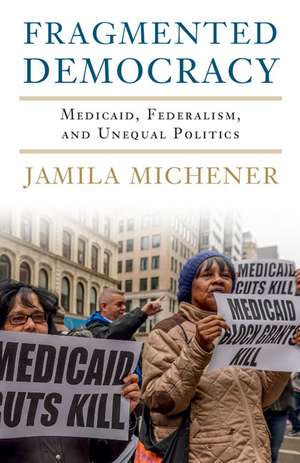Fragmented Democracy: Medicaid, Federalism, and Unequal Politics
Autor Jamila Micheneren Limba Engleză Paperback – 21 mar 2018
| Toate formatele și edițiile | Preț | Express |
|---|---|---|
| Paperback (1) | 147.81 lei 3-5 săpt. | |
| Cambridge University Press – 21 mar 2018 | 147.81 lei 3-5 săpt. | |
| Hardback (1) | 546.53 lei 6-8 săpt. | |
| Cambridge University Press – 21 mar 2018 | 546.53 lei 6-8 săpt. |
Preț: 147.81 lei
Nou
Puncte Express: 222
Preț estimativ în valută:
28.28€ • 30.82$ • 23.83£
28.28€ • 30.82$ • 23.83£
Carte disponibilă
Livrare economică 02-16 aprilie
Preluare comenzi: 021 569.72.76
Specificații
ISBN-13: 9781316649589
ISBN-10: 131664958X
Pagini: 236
Ilustrații: 16 b/w illus. 3 maps 11 tables
Dimensiuni: 153 x 228 x 13 mm
Greutate: 0.33 kg
Editura: Cambridge University Press
Colecția Cambridge University Press
Locul publicării:New York, United States
ISBN-10: 131664958X
Pagini: 236
Ilustrații: 16 b/w illus. 3 maps 11 tables
Dimensiuni: 153 x 228 x 13 mm
Greutate: 0.33 kg
Editura: Cambridge University Press
Colecția Cambridge University Press
Locul publicării:New York, United States
Cuprins
1. Medicaid, political life and fragmented democracy; 2. Federalism, citizenship and contextualized policy feedback; 3. Federalism, healthcare and inequity: past and present; 4. The mis(education) of Medicaid beneficiaries in the American states; 5. Pushing back: particularistic resistance in county contexts; 6. Going local: people, places and social policy in the city; 7. Nothing about us, without us: policy advocacy in a fragmented polity; 8. Federalism, policy and political inequality; References; Appendix A: qualitative interviews; Appendix B: statistical tables; Index.
Recenzii
'I have not read a book in a better part of a decade where I learned as much or where my ideas of American federalism were so usefully challenged. With incredibly keen insight and breathtaking analysis, Jamila Michener unearths the dire ramifications of how people-based policies intersect with place-based inequalities. Federalism may feed liberty but it also undermines equality, one of our nation's most cherished ideals. … Fragmented Democracy will revive debates about democracy in America, federalism and its consequences, racialized poverty and political inequality, and the importance of place in political life. The message takes on urgent importance in our time, pushing us to reimagine the policy at the local, state, and national levels. … An extraordinary achievement.' Vesla Mae Weave, Michael Bloomberg Distinguished Professor of Political Science and Sociology, The Johns Hopkins University
'This blockbuster book uses a rich, multi-method approach to examine the profound implications of federalism for American democracy. Due to the heterogeneity arising from giving policy responsibilities to state and local governments, the poor face extraordinarily varying levels of policy responsiveness and political incorporation, based on the lottery of where they happen to live. Everyone interested in poverty, inequality, and citizen participation should read this deeply creative and thought-provoking analysis.' Andrea Louise Campbell, Massachusetts Institute of Technology
'Jamila Michener has given scholars and citizens a great gift. Fragmented Democracy is a tour de force of empirical political analysis that doubles as an unusually humane and incisive meditation on the troubled state of American citizenship. … Fragmented Democracy is a powerful work of critical, empirically grounded political analysis. It deserves to be widely read and discussed.' Joe Soss, Cowles Professor for the Study of Public Service, University of Minnesota
'Jamila Michener has written a powerful, engaging and urgent book that shows, with devastating clarity, the effects of our federal system on the political equality of tens of millions of Americans, particularly the poor and African-Americans.' Lisa L. Miller, Rutgers University, New Jersey
'The book … contributes to our understanding of minority politics and racial inequality in the American context, as Medicaid disproportionally serves people of color who live in or near poverty. At the micro-level, the author does an exceptional job putting a face to those who experience the injustices of the Medicaid system.' Mariely Lopez-Santana, Publius: The Journal of Federalism
'This blockbuster book uses a rich, multi-method approach to examine the profound implications of federalism for American democracy. Due to the heterogeneity arising from giving policy responsibilities to state and local governments, the poor face extraordinarily varying levels of policy responsiveness and political incorporation, based on the lottery of where they happen to live. Everyone interested in poverty, inequality, and citizen participation should read this deeply creative and thought-provoking analysis.' Andrea Louise Campbell, Massachusetts Institute of Technology
'Jamila Michener has given scholars and citizens a great gift. Fragmented Democracy is a tour de force of empirical political analysis that doubles as an unusually humane and incisive meditation on the troubled state of American citizenship. … Fragmented Democracy is a powerful work of critical, empirically grounded political analysis. It deserves to be widely read and discussed.' Joe Soss, Cowles Professor for the Study of Public Service, University of Minnesota
'Jamila Michener has written a powerful, engaging and urgent book that shows, with devastating clarity, the effects of our federal system on the political equality of tens of millions of Americans, particularly the poor and African-Americans.' Lisa L. Miller, Rutgers University, New Jersey
'The book … contributes to our understanding of minority politics and racial inequality in the American context, as Medicaid disproportionally serves people of color who live in or near poverty. At the micro-level, the author does an exceptional job putting a face to those who experience the injustices of the Medicaid system.' Mariely Lopez-Santana, Publius: The Journal of Federalism
Notă biografică
Descriere
Because of federalism, Medicaid takes very different forms in different places. This has dramatic and crucial consequences for democratic citizenship.
